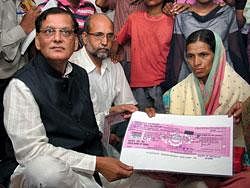
Speaking at the Cambridge Union Society last night, Pathak said the Sulabh sanitation campaign will spread to 50 more developing countries in Africa, Asia, Latin America and the Middle East to achieve United Nations' millennium development goal (MDG).
The Society had invited Pathak to understand his ongoing campaign against the practice of manual scavenging of human excreta and promotion of sanitation.
Known for its debating culture, the Society is the oldest student debating society in the world and Cambridge University's largest.
Pathak said that his organisation would construct public toilets in developing countries to popularise Indian toilet system to ensure proper sanitation in near future.
Pathak said: "In the developing countries of Asia, Africa and Latin America the sanitation problems are many and complex, like defecation in the open, manual cleaning of human waste etc".
In these countries 2.6 billion people have no access to safe and hygienic toilets. Sulabh planned to help in implementing these technologies in 50 countries over five years, where the sanitation coverage is less than 50 per cent of the population, he added.
He said that there was a plan to construct 500 public toilets in each of the 50 developing countries.
Pathak, along with his team, has developed an indigenous two-pit toilet technology, which is not only cost effective but can also be used in producing biogas.
Recycling and reuse of human excreta for biogas generation is an important way to get rid of health hazards.
He said that the US Army had also shown interest in replicating the Sulabh public toilet system for war-ravaged Afghanistan and expressed the desire to get a detailed concept report on the biogas-based Sulabh public toilet system.
The Engineering and Facilities wing of the US Army wishes to extend the concept of construction of public toilets in and around 40 places in Kandahar, the second important city of Afghanistan, he said.
Pathak says, "We are training and empowering people in Sulabh technologies which are free from patent. We have constructed public toilets in Afghanistan and Bhutan. We have trained professionals from 14 countries of Africa in collaboration with UN-HABITAT, so that they may replicate these technologies in their respective countries."
Sulabh has so far installed over 1.2 million toilets, and the Government of India has constructed 54 million such toilets.